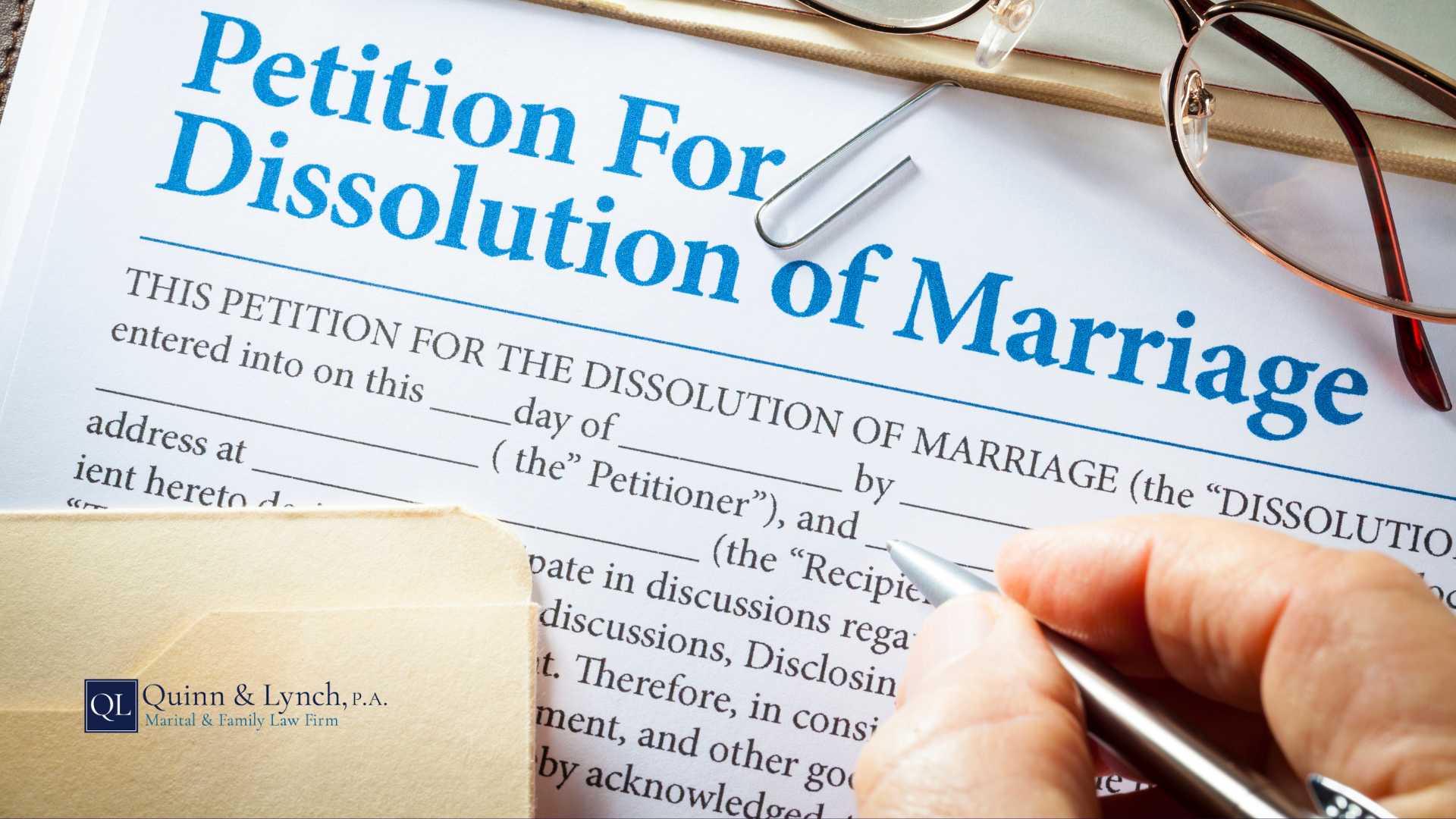Our Tampa divorce planners are often asked about how to file for divorce in Florida.
Filing for a dissolution of marriage in Florida requires completing the necessary paperwork and submitting the correct forms to the court. The process begins when one spouse files a petition for divorce, outlining key issues such as asset division, child custody, and support. A judge then reviews the case and ensures all legal requirements are met before granting the final divorce order. Properly handling the required forms and court procedures is essential for a smooth divorce process.
Types of Divorce in Florida
There are two primary types of divorce in Florida: simplified or regular dissolution of marriage.

Simplified Dissolution of Marriage
A simplified dissolution of marriage typically applies to spouses who have no major disagreements on marital assets or debts. If there are no minor children and a spouse isn’t currently pregnant or seeking spousal support payments, this can qualify for a simplified dissolution of marriage under Florida law.
A Simplified Dissolution of Marriage is strictly for couples who meet all of the following conditions:
- Both spouses agree to use the simplified process
- There are no minor children from the marriage
- The wife is not pregnant
- Both parties agree on how to divide assets and debts
- Neither spouse is seeking alimony
- At least one spouse has lived in Florida for six months
- Both spouses waive the right to a trial and appeal
If any of these conditions are not met, the couple must proceed with a regular dissolution of marriage, which can be contested, uncontested, or collaborative based on their circumstances.
Regular Dissolution of Marriage
A regular marriage dissolution applies to couples who share minor children or marital assets. Some couples may file for a regular marriage dissolution if they seek spousal support or want to preserve legal rights on certain matters.
Uncontested Divorce
Both uncontested divorce and Simplified Dissolution of Marriage are quicker alternatives to traditional contested divorce, but they have distinct eligibility requirements and legal processes under Florida law. An uncontested divorce is more flexible than a Simplified Dissolution of Marriage and involves the following:
- Can involve minor children if both spouses agree on custody, child support, and parenting time.
- Spousal support can be part of the divorce agreement.
- Only one spouse is required to attend the final hearing.
- If an agreement is fully settled, there is no trial, but either spouse retains the right to appeal if issues arise later.
Contact our Tampa uncontested divorce lawyers to learn more.
Contested Divorce
A contested divorce occurs when spouses cannot agree on one or more key issues. When comparing contested vs uncontested divorce in Florida, a contested divorce requires court intervention, which may include mediation, multiple hearings, and even a trial if a resolution is not reached.
- Disputes over marital property and debts
- Disagreements on alimony
- Conflicts over time-sharing and support
- One spouse contests the grounds for divorce
Collaborative Divorce
A collaborative divorce is a non-adversarial approach where both spouses agree and work together, along with their attorneys, to reach a mutually beneficial settlement outside of court. The Florida collaborative divorce process allows for a more amicable and cost-effective resolution compared to traditional litigation.
- Both spouses hire Tampa collaborative divorce lawyers to represent them.
- A legally binding participation agreement is signed, committing both parties to resolving disputes without court intervention.
- Financial specialists, child specialists, or mental health professionals may assist in negotiations.
- If an agreement is not reached, both attorneys must withdraw, and the case proceeds to a contested divorce.
The collaborative divorce process provides a private, cooperative environment that helps couples maintain control over the outcome rather than leaving decisions up to the court.
Default Divorce
- Happens when one spouse files for divorce, but the other fails to respond within the required timeframe.
- The court may grant a divorce based solely on the petitioning spouse’s requests.
Military Divorce
Florida military divorces involve unique legal considerations, including federal laws governing military pensions, benefits, and active-duty protections. The Servicemembers Civil Relief Act (SCRA) may allow delays in divorce proceedings if a partner is deployed.
Tampa military divorce attorneys help service members navigate complex issues such as jurisdiction, custody, and retirement division. Using a Florida military divorces checklist can ensure all necessary documents, including military pay statements, service records, and housing allowances, are properly addressed.

Florida Divorce Mediation Process
The mediation process allows divorcing couples to negotiate and settle disputes outside of court with the help of a neutral mediator. This process is often required in contested divorces and helps resolve issues. Tampa divorce mediation lawyers guide clients through negotiations, ensuring their rights and interests are protected.
A Florida divorce mediation checklist can help both parties prepare by gathering necessary financial documents, listing marital property, and clarifying priorities before mediation. If successful, mediation leads to a legally binding settlement agreement, avoiding the need for a costly and time-consuming trial.
Florida Residency Requirements for Filing For Divorce
Before filing for divorce in Florida, you or your spouse must have lived in Florida for at least six months before you file a divorce petition. To prove this, you must provide a copy of your Florida driver’s license, identification card, or voter registration card.
What are Florida Divorce Records?
Florida divorce records are official court documents that detail the legal proceedings of a dissolution of marriage. These records typically include the divorce petition, final judgment, parenting plans, property division agreements, and financial disclosures. Some parts of these records, such as the final divorce decree, are public record, meaning they can be accessed by the public unless sealed by the court. However, sensitive information, including financial affidavits, Social Security numbers, and custody details, may be restricted. Divorce records can be obtained through the Florida Clerk of Court in the county where the final hearing took place.
Florida Divorce Process

One Spouse Files a Petition For the Dissolution of Marriage
The divorce process in Florida begins when one spouse files a petition for the dissolution of marriage with the court system. The petitioner files this divorce petition to formally state that the marriage is irretrievably broken and outline any requests for alimony, child support, and equitable distribution of assets.
Depending on the circumstances, the couple may proceed with a regular dissolution or simplified dissolution of marriage. If dependent children are involved, additional legal documents and paperwork are required to establish custody and support arrangements. Once filed, the divorce case moves forward through negotiations, mediation, or litigation if the spouses cannot reach an agreement.
The Other Spouse Files An Answer To The Petition For the Dissolution of Marriage
After the petitioner files a divorce petition, the other party must file an official response with the court system within 20 days. If the divorce is uncontested, where both spouses agree on all terms, the response may be a short form filing with minimal supporting documents.
In a contested divorce, the responding spouse may file a long form answer, disputing certain terms and requesting a trial where both parties can cross-examine witnesses.
If no response is filed, the court may enter a default judgment. For contested divorce cases, the legal process may proceed to a final hearing or trial, where a judge signs the final order after reviewing all arguments. Once finalized, the divorce becomes a public record.
Additional Forms For Florida Divorces With Minor Children
Parties must submit additional forms concerning financial information, child support, and parenting plans. Under Florida law, the following forms may be required:
Uniform Child Custody Jurisdiction and Enforcement Act Affidavit
The Uniform Child Custody Jurisdiction and Enforcement Act (UCCJEA) Affidavit is a required legal document in Florida divorce cases involving minor children. It provides basic information about where the child has lived for the past five years and answers basic questions related to child support or custody disputes. This affidavit ensures the correct state has jurisdiction over the case and helps prevent conflicting custody orders across states.
Child Support Guidelines Worksheet
The Child Support Guidelines Worksheet is a required form for divorces in Florida involving dependent children. It helps calculate financial obligations based on each parent’s income, expenses, and time-sharing arrangement. A Tampa child support law firm can assist in completing and filing this worksheet to ensure compliance with Florida law.
Family Law Financial Affidavit
The Family Law Financial Affidavit is a required document in Florida divorces that discloses income, expenses, assets, and debts. This financial affidavit helps the court system determine child support, alimony, and property division. Filing an accurate financial affidavit is crucial, as any misrepresentation can impact the final hearing.
Certificate of Compliance with Mandatory Disclosure
This is a required form for divorces in Florida, ensuring both spouses exchange financial information. This includes tax returns, bank statements, property records, and other financial documents. While these disclosures are shared between each spouse, they are not typically part of the public record unless filed with the court.

Mandatory Disclosure of Financial Information
To divorce in Florida, both spouses must exchange financial information through the mandatory disclosure process. This includes submitting bank statements, tax returns, property records, and other relevant financial documents to ensure fair decisions regarding alimony, child support, and asset division.
The disclosure process is crucial in both litigation and the mediation process, as it helps determine each spouse’s financial standing. Divorce attorneys assist in gathering and reviewing these forms and provide legal advice to ensure compliance and protect their client’s interests.
If you’re filing for a divorce and have a higher number of assets, working with a high-asset divorce attorney in Tampa is recommended.
Create a Parenting Plan For Minor Children
When filing for divorce in Florida, parents of dependent children must establish a parenting plan that outlines time-sharing and decision-making responsibilities. The court system requires this plan to ensure the child’s best interests are met before granting a final hearing.
Parents can work together on parenting plan agreements, use Florida parenting plan templates, or seek guidance from a Tampa child custody attorney to create a structured parenting plan that meets legal requirements. If parents are not in agreement, the court will decide on parenting plan arrangements based on the child’s well-being, stability, and parental involvement.
Final Order of Divorce
The final order of divorce is issued after the final hearing, officially ending the marriage. During this process, the judge reviews all legal documents, divorce papers, and paperwork to ensure the terms of the divorce term comply with Florida law. If both parties agree on all terms, the court may finalize the dissolution of marriage without a trial.
However, if disputes remain, a trial is held where both sides present evidence, and the other party has the opportunity to respond. Having legal representation can help ensure a fair outcome when filing for divorce in Florida, as attorneys assist with preparing legal documents and advocating for their client’s best interests.
How Our Tampa Divorce Attorneys Help
Whether pursuing a simplified or regular dissolution of marriage, working with a divorce lawyer in Tampa, FL, can help ensure a smooth legal process. When a marriage is irretrievably broken, filing a divorce petition is the first step toward resolving issues like equitable distribution of assets, alimony, and child custody. With experienced legal representation, you can navigate Florida’s divorce laws with confidence and protect your rights. Call 813-223-7739 today to discuss your case and take the next steps toward your future.













